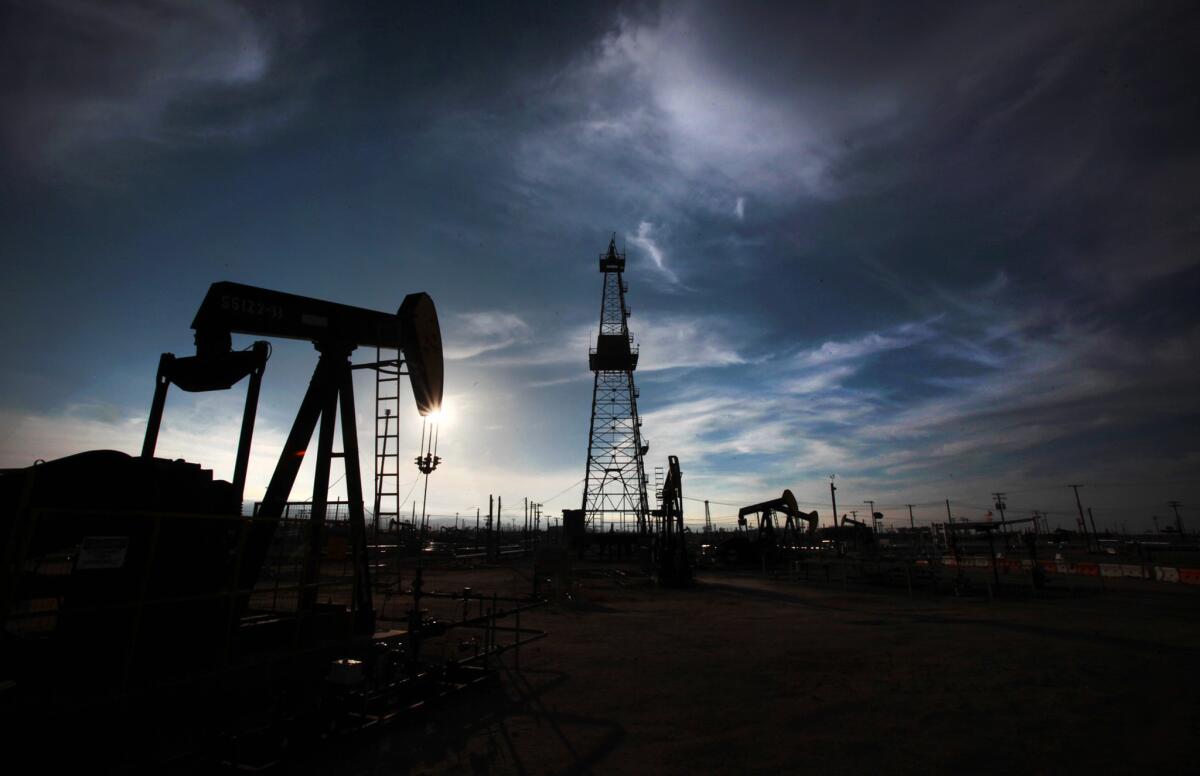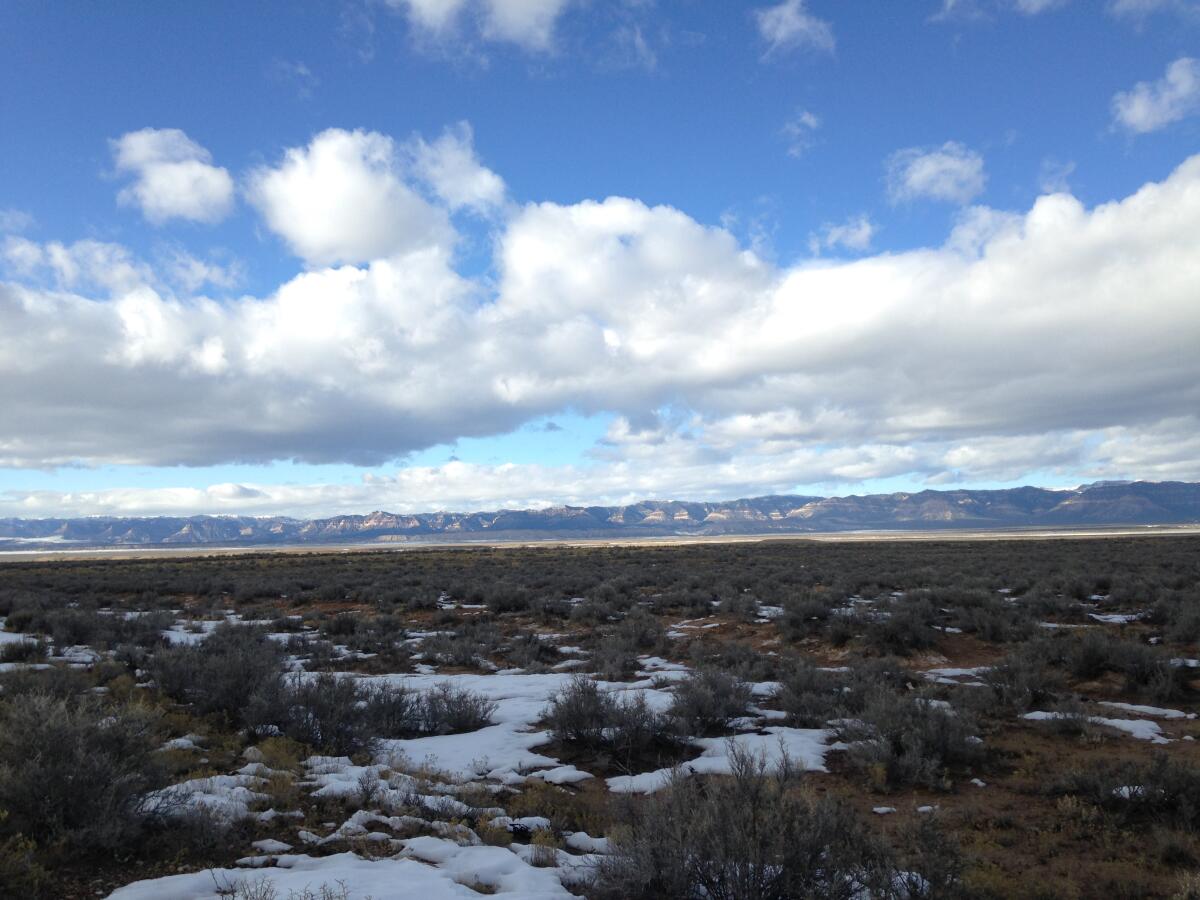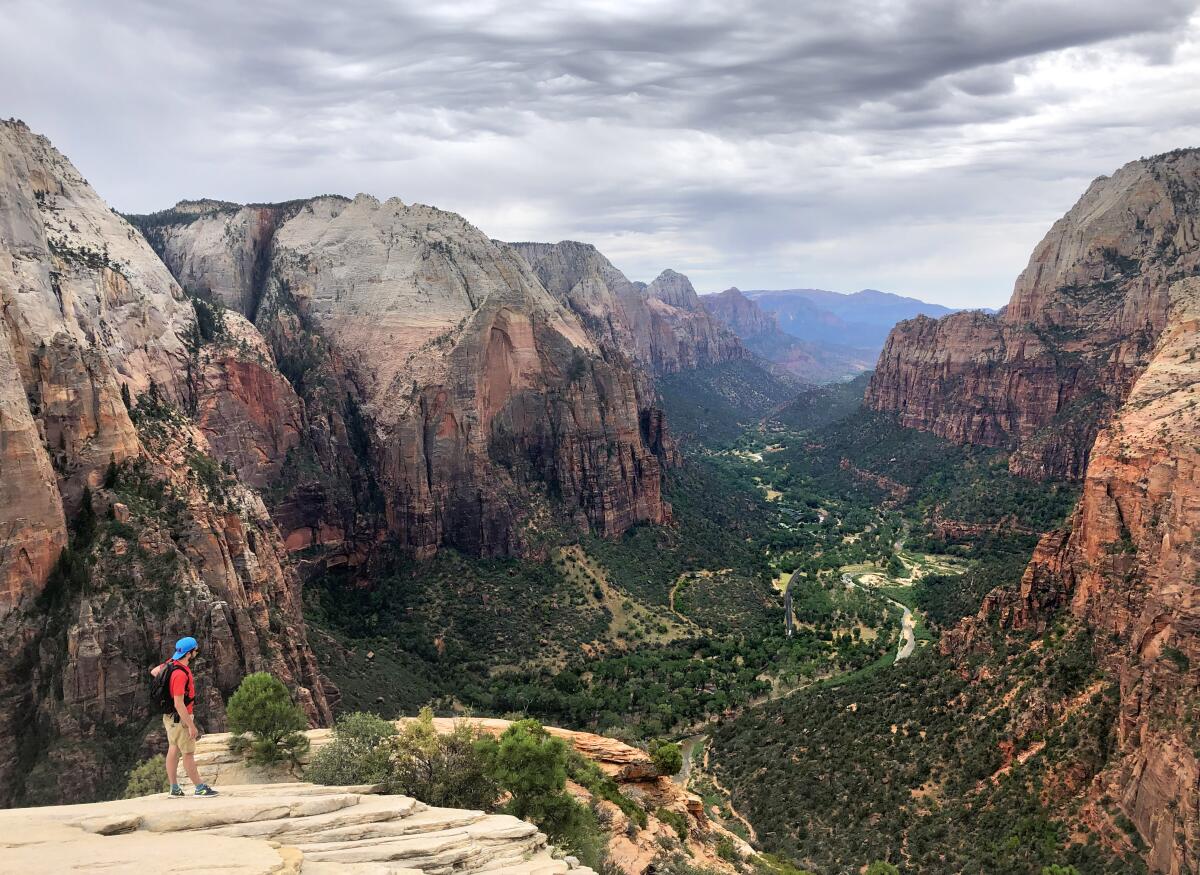Boiling Point: Obama wouldn’t keep fossil fuels in the ground. But Biden says he will

- Share via
This is the Dec. 17, 2020, edition of Boiling Point, a weekly newsletter about climate change and the environment in California and the American West. Sign up here to get it in your inbox.
It’s been nearly five years since the chilly February morning when I shuffled into the back of a conference room at Salt Lake City’s convention center to watch the federal government auction off oil and gas drilling rights for up to 45,000 acres of public lands. There were nearly 100 protesters in the room too, part of a growing campaign urging the Obama administration to stop allowing new fossil fuel extraction on lands and waters owned by the American people.
The protesters hadn’t planned to disrupt the bidding. But once the auctioneer started, they broke out in spontaneous chants, rising in volume until the proceedings ground to a halt: “People gonna rise like the water, gonna calm this crisis down. I hear the voice of my great-granddaughter, saying, ‘Keep it in the ground!’”
Police ultimately escorted them out, as I reported for the Desert Sun at the time.
Afterward, as I got lost trying to exit the cavernous convention center, I bumped into the renowned environmental writer Terry Tempest Williams. To my surprise, she told me she had agreed to pay $1.50 per acre to buy drilling rights on 800 acres that hadn’t gotten any competitive bids, with the intention of keeping the land out of the hands of the fossil fuel industry. She ultimately paid for 1,120 acres, a move that drew national attention, especially after the federal government refused to issue the leases.
So it was an eventful morning in Salt Lake.
I watched another oil and gas auction last week, but this one was less dramatic. The federal government has moved all its lease sales online, eliminating the ability for protesters to raise hell. So instead of showing up at a convention center, I sat on my couch and pressed “refresh” a bunch of times as the EnergyNet website updated to reflect digitally submitted bids for 4,100 acres in California’s Kern County, north of Los Angeles.
The whole thing was boring. If you don’t believe me, here’s a screenshot:
Why am I telling you all this? Because with President-elect Joe Biden just a month away from taking office, even online auctions could soon be relegated to the history books.
After years of activism by the “keep it in the ground” movement, almost every Democratic presidential candidate, including Biden, vowed to end new fossil fuel leasing on federal lands. That’s a seismic shift from 2016, when the Obama administration was still promoting an “all of the above” energy strategy that saw U.S. oil and gas production boom.
I called Tim Ream, who as climate and energy campaign director for WildEarth Guardians played a key role in making “keep it in the ground” a national rallying cry. He had helped lead the protest at that raucous auction in Salt Lake.
“We took an idea nobody was talking about and made it Democratic Party orthodoxy,” Ream said.
Toward a more sustainable California
Get Boiling Point, our newsletter exploring climate change, energy and the environment, and become part of the conversation — and the solution.
You may occasionally receive promotional content from the Los Angeles Times.
The climate benefits could be huge. The Wilderness Society estimates that planet-warming pollution from oil, gas and coal extracted from federal lands is equivalent to between one-fifth and one-fourth of all U.S. carbon emissions.
Oil and gas companies argue that a leasing moratorium would merely shift production overseas. But a recent working paper from the think tank Resources for the Future concluded there would be still large emissions reductions even with some “leakage.”
Fossil fuel supporters also argue that bringing new extraction to a halt could cripple the finances of state and local governments. Wyoming officials released a report this week finding that ending federal lease sales would cost eight Western states $8.1 billion in tax revenues over the next five years. Some of the biggest losses could be seen in New Mexico, where the oil and gas industry is projected to account for 40% of the state’s total revenue this year.
For climate activists, those kinds of numbers highlight the need for a “just transition” in which fossil-fuel-dependent communities receive robust federal support.
Chase Huntley, who leads the Wilderness Society’s energy and climate program, pointed to legislation from U.S. Rep. Raúl M. Grijalva, an Arizona Democrat and chair of the House Natural Resources Committee, that would pause new leases while also increasing royalty rates on existing leases. Those funds would go toward wage support or long-term investments in economic growth for people and towns losing fossil fuel jobs.
The bill would also set a federal goal of net-zero carbon emissions from public lands and waters — a nod to the fact that protected places tend to be more effective at absorbing carbon from the atmosphere.
“Public lands and waters are an underappreciated piece of the climate puzzle,” Huntley said.

Similarly, new leases are just one piece of the public lands puzzle. As of October 2018, the federal Bureau of Land Management had more than 25 million acres under lease for oil and gas extraction, with about half that acreage in production.
A leasing moratorium wouldn’t stop oil and gas drilling on those not-yet-producing lands. But Ream pointed out that while Biden at times campaigned on ending new leasing, at other times he pledged to end new permitting as well. There’s a difference. Ending permitting would mean not allowing companies to drill even on lands they’ve already leased.
Halting new permits would almost certainly prompt lawsuits by oil and gas companies that paid for leases. But Ream thinks it would send a powerful signal to the international community after four years of U.S. inaction on climate change.
“The Biden administration is going to need to do something which is big and bold, and signals to the rest of the world that we are serious about dealing with climate change,” he said.
I reached out to the Biden transition team to ask whether it would clarify what the president-elect actually promised to do; I didn’t get a response. But as the climate crisis worsens, activists expect the new administration to move as boldly as possible. More than 500 groups sent Biden a letter this week urging him to sign an executive order banning all oil and gas leasing and permitting.
And what about the millions of acres of public lands where coal, oil and gas are currently being extracted? Activists say that production will eventually need to be wound down too, although doing so will probably take decades. In the meantime, federal officials could take steps to reduce emissions from those operations, such as reinstituting Obama-era methane regulations.
Biden could also make sure taxpayers are getting a good deal on federal fossil fuels for as long as extraction continues.
The nonpartisan Government Accountability Office released a report last week on leases sold between 2003 and 2009, finding that 98.8% of noncompetitive leases — those sold for a small fee after not receiving any bids at auction — didn’t produce a single drop of oil or gas over their first 10 years. Critics say it’s a sign that public lands are being locked up by oil and gas companies with no benefit to taxpayers, while crowding out recreation, conservation and renewable energy development.
In a letter to Interior Secretary David Bernhardt last week, 16 congressional Democrats voiced fears that speculators who may not have any ability to drill are being allowed to lock up federal lands in the final months of the Trump administration.
“These lands belong to the American people and they are entitled to a fair return,” the letter says.
Ironically, that was the Bureau of Land Management’s reason for denying oil and gas leases to Tempest Williams five years ago, when she made clear she had no intention to drill. She and her husband appealed that decision.
Nearly five years later, their appeal is still pending. We’ll see what the Biden administration has to say.
Here’s what else is happening around the West:
TOP STORIES

Global greenhouse gas emissions dropped by a record 7% this year due to the COVID-19 pandemic. But the United Nations says those cuts will last only if countries prioritize low-carbon investments in their economic recoveries, as Tony Barboza reports for The Times. Columnist Steve Lopez, meanwhile, writes that even California still isn’t doing enough to confront the climate crisis. Without more aggressive action, “what we’ve witnessed in 2020 will one day seem absolutely normal,” he writes.
I’ve written quite a bit about efforts by fossil fuel companies to ward off aggressive climate policies by attempting to show grass-roots support for their products. But I was still surprised by this story by Mother Jones’ Rebecca Leber, who discovered that the website “Women for Natural Gas” — which was created by an industry-funded group — has been promoting the planet-warming fuel using stock photos and almost certainly faked testimonials claiming to be from women who love natural gas.
Gov. Gavin Newsom wants to ban the sale of gasoline-powered vehicles in California by 2035. But is it doable? The San Diego Union-Tribune’s Rob Nikolewski wrote an excellent deep dive into the mechanics of how it might work, including why it won’t be easy for Californians to just cross state lines to buy gas cars. Rob also reported that Sempra Energy-owned San Diego Gas & Electric has agreed to refund $51.6 million to customers after botching an energy-efficient lightbulb program and lying about it.
Enjoying this newsletter? Consider subscribing to The Times
Your support helps us deliver the news that matters most, and makes newsletters like Boiling Point possible. Become a Los Angeles Times subscriber.
POLITICAL CLIMATE
The Biden administration’s Cabinet picks have been coming fast and furious. Here’s a quick rundown of the president-elect’s choices for several climate-relevant positions:
- Former Environmental Protection Agency chief Gina McCarthy will be the first-ever national climate advisor, tasked with coordinating the administration’s domestic agenda (story by Juliet Eilperin and Brady Dennis, Washington Post).
- Xavier Becerra, California’s attorney general, has been tapped to run the Department of Health and Human Services. He created the first environmental justice bureau in an attorney general’s office (John Schwartz, New York Times).
- Former Michigan Gov. Jennifer Granholm is Biden’s choice for Energy secretary. She’s got extensive experience dealing with the auto industry, one of the country’s biggest sources of climate pollution (Tyler Pager and Zack Colman, Politico).
- Pete Buttigieg gets the nod for Transportation secretary. During his time as mayor of South Bend, Ind., a major focus for him was building a downtown corridor friendlier to bikers and pedestrians (Reid J. Epstein and Coral Davenport, New York Times).
- And finally, Biden chose former Agriculture Secretary Tom Vilsack to reprise his old role. If confirmed, he’ll have the tough task of helping farmers both reduce emissions and adapt to the changing climate (Dino Grandoni, Washington Post).
Biden hasn’t announced a pick to lead the EPA, but it probably won’t be Mary Nichols, chair of the California Air Resources Board. The New York Times’ Coral Davenport reports that Biden’s team is looking for another candidate because of concerns raised by environmental justice activists over Nichols’ support for cap and trade, a climate program that critics say allows polluters to keep operating in communities of color. Either way, Nichols is stepping away from her job in California. Gov. Gavin Newsom has selected Liane Randolph, a member of the state’s Public Utilities Commission, to replace her, Politico’s Debra Kahn reports.
France’s ambassador to the U.S. says Biden is sending the right signals on climate. In a Q&A with my colleagues Tracy Wilkinson and Anna M. Phillips, Philippe Etienne praised Biden’s choice of John Kerry to lead international climate affairs, saying Kerry “is not only incredibly, incredibly knowledgeable, he was one of the main negotiators of the Paris climate agreement.”
ON OUR PUBLIC LANDS

President Trump touted the Great American Outdoors Act as a major achievement when Republican senators in Colorado and Montana thought it would help them get reelected. But critics say the Trump administration is undermining the law’s implementation, as Judy Fahys reports for Inside Climate News. The Biden administration is likely to take a different approach.
The Bureau of Land Management’s lease on its Washington, D.C., office expires this month. But as the federal agency moves to Grand Junction, Colo., some ranchers say the new headquarters won’t actually be more accessible to Westerners, Caroline Tracey reports for the Guardian. The move is supported by lawmakers such as Rep. Rob Bishop (R-Utah), a longtime opponent of public lands protections whose long congressional tenure is now coming to an end, the Salt Lake Tribune’s Lee Davidson reports.
Here in California, the state parks department is renting out high-value government-owned homes in beautiful locations to lucky employees on the cheap. That’s the conclusion of a fascinating investigation by my colleague Melody Gutierrez.
WATER IN THE WEST
In the desert north of Los Angeles, a Navy base’s demand for water is coming into conflict with pistachio farmers who produce nuts for Stewart Resnick’s Wonderful Co. The battle is a key test of California’s sweeping groundwater sustainability law, which requires local governments to eventually stop the over-pumping of aquifers, as Brent Crane reports for Bloomberg. My colleague Louis Sahagun reported last year on a potential solution to this thorny problem involving the city of Los Angeles.
New Mexico won a victory at the U.S. Supreme Court in a water dispute with Texas over the Pecos River. Here’s the story from Phill Casaus at the Santa Fe New Mexican, who writes that a more consequential water conflict between the states has yet to be decided by the high court. The now-resolved dispute involved water evaporating from reservoirs, a growing issue in the West as higher temperatures make the atmosphere thirstier. The Nevada Independent’s Daniel Rothberg wrote about the latest science on “evaporative demand,” which scientists say could increase as much as 18% in California and Nevada by century’s end.
In Arizona, many residents of the Hopi Reservation don’t have access to indoor plumbing. Unlike in major cities across the Southwest, the federal government hasn’t invested in basic water infrastructure the Hopi desperately need, as Ian James reports for the Arizona Republic. Elsewhere in the state, the Colorado River Indian Tribes hold the right to a great deal of valuable river water, and they’re pushing for federal legislation that would allow them to lease it to cities, Circle of Blue’s Brett Walton reports.
ONE MORE THING
I had almost forgotten about Ryan Zinke. But as the Trump administration takes its curtain call, here’s one more story about the former Interior secretary, who resigned in late 2018 under a cloud of scandal. His official portrait has now been unveiled, and the Huffington Post’s Chris D’Angelo reports that it features Zinke “riding a horse through Bears Ears National Monument shortly before he and Trump trashed the protected site,” which is sacred to many Native Americans.
Tribal groups were not pleased.
We’ll be back in your inbox next week. If you enjoyed this newsletter, please consider forwarding it to your friends and colleagues.




